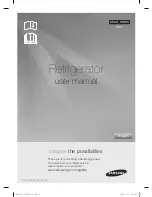
17
ATTENTION: En dehors des températures
ambiantes indiquées par la classe climatique
d’appartenance de ce produit, il est obligatoire de
respecter les indications suivantes: lorsque la
température ambiante descend sous la valeur
minimum, la température de conservation du
compartiment congélateur peut ne pas être
garantie; il est donc conseillé de consommer les
produits que ce dernier contient au plus vite.
•
Un produit décongelé ne doit jamais être
recongelé.
•
Suivez les indications du fabricant pour la
conservation et/ou congélation des aliments.
•
Dans tous les appareils de réfrigération et
congélation il y a des surfaces qui se couvrent de
givre. Suivant le modèle, ce givre peut être
éliminé automatiquement (dégivrage
automatique) ou bien manuellement.
•
N’essayez jamais d’enlever le givre avec un objet
métallique, vous risqueriez d’endommager
irréparablement l’évaporateur. N’employez pour
cela que la spatule en plastique livrée avec
l’appareil.
•
De même, ne décollez jamais les bacs à glace
avec un couteau ou tout autre objet tranchant.
•
Ne placez ni bouteilles ni boîtes de boissons
gazeuses dans le congélateur/compartiment à
basse température, elles pourraient exploser.
Protection de
l’environnement
Cet appareil ne contient pas, dans son circuit de
réfrigérant et ses matières isolantes, de gaz
réfrigérant nocif à la couche d’ozone. L’appareil
ne doit pas être mis au rebut avec les ordures
ménagères et la ferraille. Il faut éviter d’endom-
mager le circuit de réfrigérant, surtout à l’arrière
de l’appareil, près de l’échangeur thermique.
Vous pouvez vous renseigner sur les centres de
ramassage auprès de votre bureau municipal.
Les matériaux utilisés dans cet appareil
identifiés par le symbole
sont recyclables.
56
Changing the opening direction of
the doors
Before carrying out any operations, remove the plug
from the power socket.
To change the opening direction of the door,
proceed as follows:
1. pull off the ventilation grille (D) which is clipped
into place;
2. remove the bottom hinge (E) by unscrewing its
fixing screws;
3. remove the lower door, sliding it out of the middle
hinge;
4. unscrew the middle hinge (H);
5. remove the upper door, releasing it from the
upper pin (G);
6. unscrew the upper pin (G) and refit it on the
opposite side;
7. remove the two plugs of the door (where
available), discovering the holes for the hinge
pins, assemble them on the opposite side and
refit the upper door;
8. reassemble the middle hinge on the opposite
side;
9. reassemble the lower door;
10. using a 10 mm spanner, unscrew the hinge pin
(E) and reassemble it on the opposite side of the
hinge;
11. reassemble the lower hinge (E) on the opposite
side, using the screws previously removed. Slide
the hole cover (F) out of the ventilation grille (D)
by pushing it in the direction of the arrow and
reassemble it on the opposite side;
12. refit the ventilation grille (D), clipping it into
place.
13.Dismantle the handles and reassemble them on
the opposite side. Cover the holes left open with
the plugs contained in the documentation pack.
To line up the doors, it is possible to adjust the
middle hinge (H) horizontally by means of a tool,
after slackening the two screws (see figure).
Warning:
After having reversed the opening direction of
the doors check that all the screws are properly
tightened and that the magnetic seal adheres to
the cabinet.
If the ambient temperature is cold (i.e.
in Winter), the gasket may not fit perfectly to the
cabinet. In that case, wait for the natural fitting of the
gasket or accelerate this process by heating up the
part involved with a normal hairdrier.
G
H
F
F
D
F
F
E
E
































